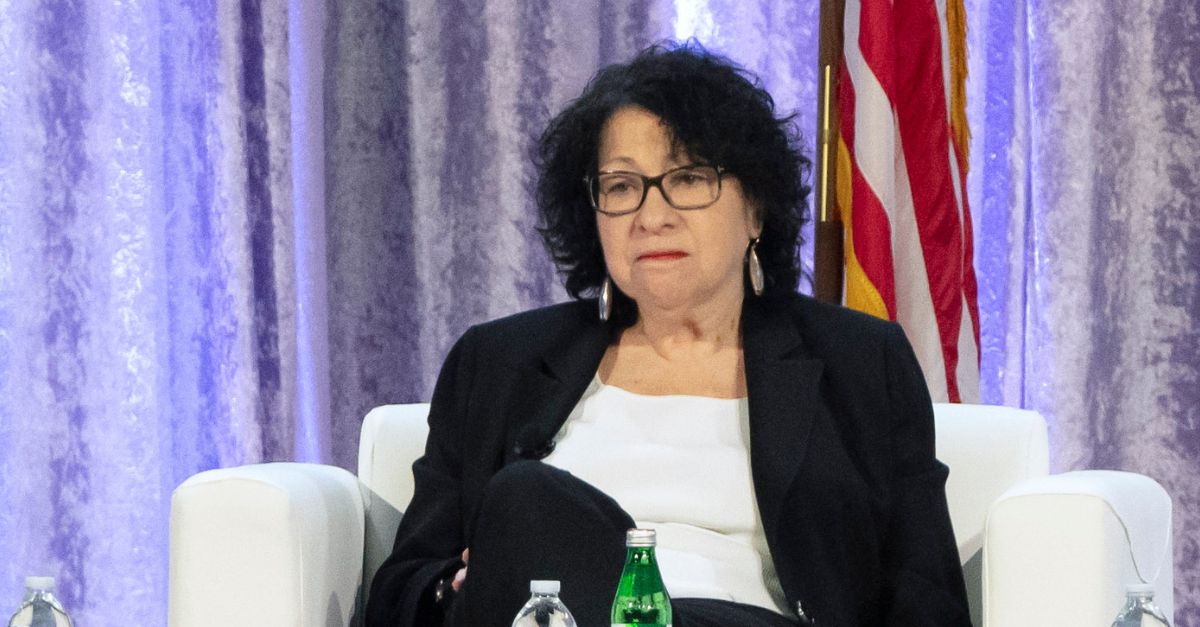

FILE – Supreme Court Justice Sonia Sotomayor talks with retired U.S. Appeals Court Judge Thomas Griffith, not visible, during a panel discussion at the winter meeting of the National Governors Association, Feb. 23, 2024, in Washington. (AP Photo/Mark Schiefelbein, File)
Supreme Court Justice Sonia Sotomayor chastised six of her fellow justices for inviting “chaos and crisis” by upholding an “unreasoned” ruling and allowing Texas to regulate immigration at its borders over the objection of the federal government.
The Supreme Court ruled 6-3 Tuesday to allow Texas S.B. 4 to go into effect while the battle over its underlying legality plays out in court. The law, which authorizes Texas law enforcement to arrest anyone suspected of illegal border crossing and charge them with crimes ranging from misdemeanors to felonies, then to prosecute and punish with jail time or returning them to Mexico, is the harshest part of Republican Gov. Greg Abbott’s anti-immigration “Operation Lone Star.” Abbott’s policies have already been blamed for contributing to the death of a migrant woman and two children who drowned when Texas authorities prevented federal Border Patrol agents from rendering aid.
At its core, the legal battle over the law is a turf war. The federal government’s position is that immigration regulation is squarely within its sole jurisdiction. Texas, by contrast, says that it has a right to protect itself from “invasion” by those crossing the U.S.-Mexico border illegally.
On Feb. 29, Senior U.S. District Judge David Alan Ezra ruled against Texas, holding that S.B. 4 violates both the Supremacy Clause and Supreme Court precedent, conflicts directly with federal immigration law, and offends American foreign relations and treaty obligations. A few days later, the New Orleans-based Fifth U.S. Circuit Court of Appeals reversed Ezra’s ruling, then immediately issued a seven-day administrative stay of its ruling. The Supreme Court extended that stay until March 11, then vacated it Tuesday, thereby allowing the law to go into effect.
Justice Samuel Alito wrote for the six-member majority and said that the decision to dissolve the stay was motivated by a desire to be hands-off with the way the Fifth Circuit managed its own docket. Alito reasoned that because the stay had been “administrative, ” it would be “unwise to invite emergency litigation” at this early step in the case.
Sotomayor was not convinced. It is precisely at this time, she argued in a dissent joined by Justice Ketanji Brown Jackson, that the Court should have ruled to protect the federal-state balance of power and neutralize Texas’s efforts to intrude into matters of purely federal authority.
Sotomayor wrote that the district court got it right when it said S.B. 4 “amounts to ‘nullification of federal law and authority — a notion that is antithetical to the Constitution and has been unequivocally rejected by the federal courts since the Civil War.'” She recounted the procedural history of the case and slammed the Fifth Circuit for issuing an order, “with no reasoned analysis” that allows Texas to “immediately enforce its own law imposing criminal liability on thousands of noncitizens and requiring their removal to Mexico.
Sotomayor cautioned that her colleagues’ ruling could cause many practical problems, echoing the Biden administration’s arguments.
This law will disrupt sensitive foreign relations, frustrate the protection of individuals fleeing persecution, hamper active federal enforcement efforts, undermine federal agencies’ ability to detect and monitor imminent security threats, and deter noncitizens from reporting abuse or trafficking.
She criticized the majority for approving a law that could cause disorder and might be unconstitutional in the long term. She pointed out that the issues involved in the debate over S.B. 4 are serious and new, and urged careful consideration of its constitutionality.
She also called out her fellow justices for framing their decision as simply managing their caseload.
She wrote that the Court did not express an opinion on the constitutionality of Texas’s law and instead deferred to a lower court's management of its workload. She believed the Court of Appeals made an unreasonable and indefinite decision that changed the status quo. She disagreed with the Court's inaction and stated her dissent.
She didn't just make general statements.
Sotomayor explained what she believed was wrong with S.B. 4, stating that it interfered with established federal authority and created practical problems for judges.
She predicted that state judges would have to ignore federal immigration proceedings based on the immigration status of the defendant, which could be pending or about to start.
She stated that the ruling on procedure was as important as the ruling on substance.
She continued to say that even one day of disruption caused by S.B. 4 based on an unreasonable order was too much, and that the Fifth Circuit's characterization of its decision as an “administrative stay” did not make it any less impactful.
Sotomayor also mentioned that the district court considered Texas’s arguments in its analysis.
She said that the Court did not deny the risk that cartels and drug trafficking pose to many people in Texas, but noted that Texas can already make those activities illegal.
She warned that the state immigration law would change the balance of power at the border and have life-altering consequences for noncitizens in Texas. She stated that the Fifth Circuit’s decision opened the door to chaos and criticized her fellow justices for making the same mistake.
